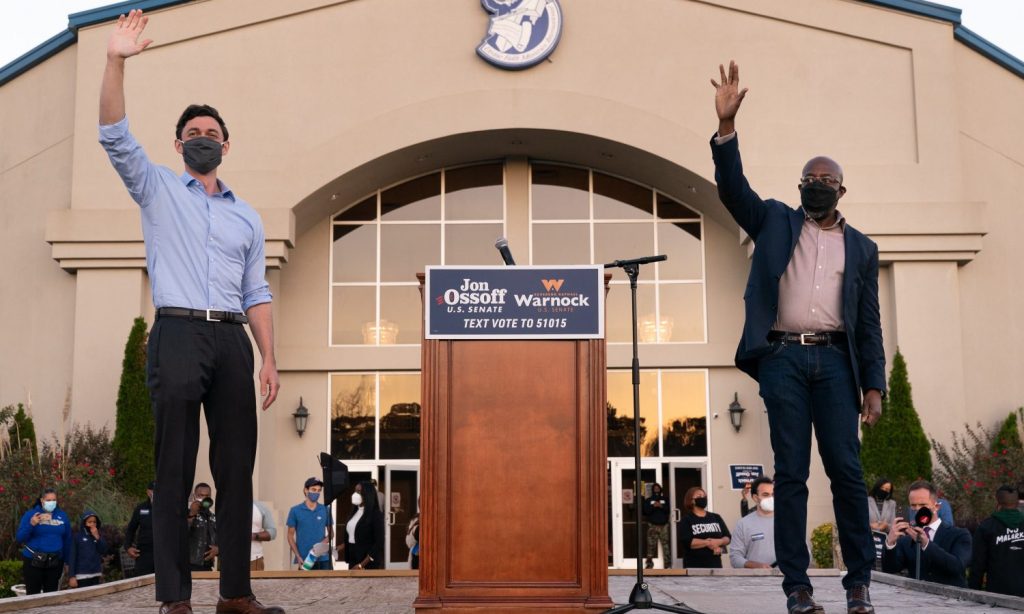Despite being mostly anti-cannabis reform, Georgia is likely to play a substantial role in the short-term future of cannabis legislation in America.
The balance of power remains up in the air on Capitol Hill. Which party ultimately gains power should determine how much of president-elect Biden’s agenda passes through Congress during the first two years of his term.
The Democrats are sure to hold power in the upcoming White House and the House of Representatives. However, two January 5 runoffs in Georgia will determine which party has the majority in the Senate.
The races’ results are expected to impact an array of Biden policy initiatives, including cannabis reform.
How Georgia’s Runoffs Could Impact The 117th Congress
The runoffs pit incumbent Republican David Perdue against John Ossoff, while the other race features another GOP incumbent, Kelly Loeffler, against Atlanta area pastor Raphael Warnock.
The Democrats need both races to secure a 50-50 share of the Senate, with Vice President-elect Harris serving as the tiebreaker. The Republicans will retain their hold of the Senate with a win in one or both races.
Despite being mostly anti-cannabis reform, Georgia is likely to play a substantial role in the short-term future of cannabis legislation in America.
The majority of the Senate is crucial, as GOP Senate Majority Leader Mitch McConnell has made it clear that cannabis reform is not happening under his leadership.
Kevin M. Bell, a Washington, D.C.-based partner at Arnall Golden Gregory LLP said, “Unless both Senate seats in Georgia flip to the Democrats, [legislation] won’t go anywhere.”
RELATED: Georgia On My Mind: The Future Of The MORE Act
Henry Baskerville, managing partner Fortis Law Partners, discussed the impact a flipped Senate should have on cannabis reform. Baskerville, who founded Fortis’ cannabis practice in 2017, said, “If Democrats ultimately take control by winning the two Senate runoff seats in Georgia, then the push for federal legalization should gain strong momentum.”
The managing partner said that the industry would expect rulings on legislation like the MORE Act and the SAFE Banking Act. He highlighted additional areas of concern, including proposed interim DEA rules on the criminalization of certain cannabinoids, as well as the USDA’s determination on THC testing in hemp.
RELATED: Chances For Federal Marijuana Legalization Live On, According To New Poll
While many sources predict a two-race win for either party, Reggie Snyder, an Atlanta-based litigation attorney and partner for the firm Taylor English, could see a split result.

Syder noted the nearly 2% margin incumbent Perdue beat Ossoff by in November as an indicator. Meanwhile, Democrat candidate Warnock beat incumbent Loeffler by 7% in November. However, the latter race could tighten as Doug Collins, a Republican opponent in November who garnered 20% of the vote, is no longer pulling votes from Loeffler.
While saying he could see a split with Warnock and Perdue winning, Snyder noted several factors could impact the result, with showing up being the most important of them all. “It truly is dependent on turnout,” said Snyder. He added, “And by and large, people just don’t show up for these one-offs.”
Market Growth, Stalled Reform Expected Under A GOP-Held Senate
While most proponents in the cannabis space prefer a Democrat-held Senate, some acknowledge that the Republicans won’t end market optimism. However, with Sen. McConnell still in power, cannabis is unlikely to see progress on Capitol Hill.
Despite a possible continued lack of growth on the federal level, experts in the space expect cannabis to thrive. “If it continues to be led by Republicans, we are still optimistic about market growth, but we are not confident about a path to federal legalization,” said Cannapreneur Partners co-CEO Todd Sullivan.
Others, including Cresco Labs co-founder Joe Caltabiano, predict that market growth should continue, regardless of leadership. However, the outcome could bring its own drawbacks. He predicted that an outcome like this would leave operators in a further banking bind.
Said Caltabiano, “The industry will continue to advance and reform will eventually occur, but near-term growth will remain hobbled by lack of banking and 280E reform.”


